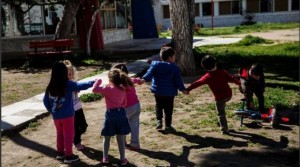A Reuters news agency report focuses on the increasing plight facing the Greek children in the years of the economic crisis, stressing they have become the most vulnerable section of society in the current depressing economic conditions. The piece sheds light on a home for abused children called the Model National Nursery, which although initially was founded as an orphans’ home is now receiving an increasing number of children because their parents are unable to provide them with the basic needs.
In Greece’s grinding economic crisis, a home for abused children is now taking in those whose parents are struggling to feed them.
It is perhaps the darkest sign of economic devastation in Greece, where traditionally strong family ties are starting to crumble after years of depression.
A quarter of Greece’s workforce is unemployed and a quarter of its children live in poverty, according to United Nations figures, forcing parents to depend on grandparents for handouts. But pensions too have been cut a dozen times.
In Athens, the Model National Nursery, set up a century ago for orphans of war, can hardly keep up with the number of parents turning to it for help. Unable to cover their basic needs, parents leave their children in the home all week.
Iro Zervaki, its head, says at least 40 children are on the waiting list, four times as many as a couple of years ago.
The home sleeps 25 in a bare room with rows of beds draped in blue blankets, and lacks the staff and funds to increase capacity, she said. Most places are for abused children.
Dozens of other children, all aged two to five, come in daily, but the days away from their parents are long.
“We had incidents where children even attempted to leave, to run away, to go to their mother,” Zervaki said.
In the buzzing playground, a little girl tugged the social worker’s blouse and yelled: “Miss! When will I go to my mum?”
“They can’t tell the days apart so every day they ask: ‘Is it Friday?'” Anthoula Zarmakoupi, the social worker, said. “They know mum will pick them up at the weekend.” But sometimes even that was not possible, she said. “We have children whose parents are homeless so it’s very difficult for them to even collect them for the weekend.”
For the home too, brighter days seem as far away as ever.
State funding has been cut and covers just half of the staff’s wages. The home depends on donations for food and clothes, and Zervaki says it is hard to tell if she will be able to make next month’s payments.
“It doesn’t look like tomorrow will be any better,” she said. “It will take some years. I hope not too many.”
Ask me anything
Explore related questions





